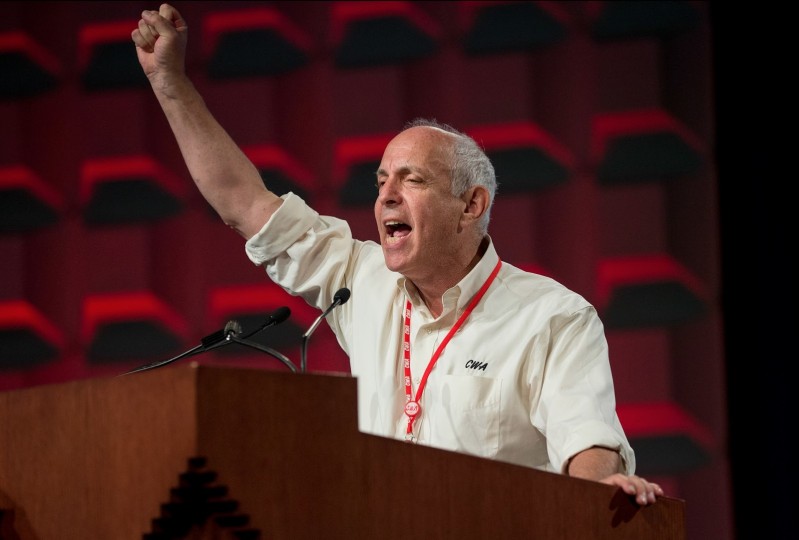Larry Cohen - Board Chair - ‘Our Revolution’
"We will push for massive resistance against any kind of social cuts"
Álvaro Guzmán Bastida 21/01/2017

Larry Cohen.
Cedida por el entrevistadoEn CTXT podemos mantener nuestra radical independencia gracias a que las suscripciones suponen el 70% de los ingresos. No aceptamos “noticias” patrocinadas y apenas tenemos publicidad. Si puedes apoyarnos desde 3 euros mensuales, suscribete aquí
_____________
En enero CTXT deja el saloncito. Necesitamos ayuda para convertir un local en una redacción. Si nos echas una mano grabamos tu nombre en la primera piedra. Del vídeo se encarga Esperanza.
Donación libre:
_____________
Larry Cohen had no time to lose. As soon as it became evident that Bernie Sanders wouldn’t be facing down Donald Trump as the Democratic nominee to U.S. President, he and a group of Sanders’ staffers launched a successor group to the democratic socialist senator’s campaign. The organization, named ‘Our Revolution’ intends to further propel the progressive forces that were emboldened by Sanders’ attempt at the Presidency. The group built upon Sanders’ legion of supporters and volunteers -including a massive email list- to help set up a structure to support progressive issues and candidates at every level of U.S. Government. Cohen, a veteran Sanders collaborator and union leader, who serves as ‘Our Revolution’ Chair, answered CTXT’s call a few hours before Donald Trump’s inauguration to discuss the organization’s purpose, its “populist” style internal functioning and agenda and how the group intends to pressure both the Trump administration and establishment Democrats to achieve progressive change.
Let’s start by doing some history: Back in March, CTXT published an analysis by Current Affairs editor, Nathan J. Robinson, which basically predicted that if the Democrats ran Hillary Clinton as a candidate, she would lose because only Bernie Sanders could defeat Trump. Do you think that was the case? Was Hillary Clinton bound to lose?
I wouldn't say bound to lose. In any other democracy, she would have been elected. She won the popular vote by 2.8 million and we have what I would call a very limited democracy here in very many ways. But I was actively involved in the primaries and I would say it was clear she was going to have trouble if it was just going to be a negative campaign about what's wrong with the republican. What was important about Bernie from the beginning, and he's always done this --I’ve known him 25 years-- is that he's running for something. If anything people might fault him politically that he didn't run much against Clinton, he much more ran on his agenda, healthcare, higher education, jobs, race, environment, social injustice. The campaign was running mostly for something. To the extent it was against something, it was the corporate democrats.
You said some people faulted Bernie for not running against Hillary Clinton as much. In retrospect, do you think the decision to back her as a candidate after losing the primary was a good one? A lot of people didn’t agree with it at the time.
Well, I think from his frame, he despises the kind of politics of Donald Trump overall. The politics of divisiveness, particularly splitting working class people, he despises that. Part of the reason he ran as a democrat to begin with was he didn’t want to repeat 2000. If he'd run as an independent, there's a good chance he would have had a similar result, except that his running as an independent would have been blamed for electing Donald Trump. So his opposition to Donald Trump and any of the republicans was always greater than his opposition to Hillary Clinton.
‘Our Revolution’, the successor group to Sander’s campaign, whose board you chair, kicked off before the election was over. Why was that and what's its purpose as an organization?
During Bernie’s campaign, all of us talked about political revolution, not just about someone who would have been a great president and is a great leader. All through the campaign, the idea was, ‘Get involved here, organize whether it's around issues or to elect someone for the school board or congress, and build a political movement.’ It became more about Bernie as it moved on, but in the beginning, the campaign was at least equally about building a mass political movement.
Is ‘Our Revolution’ a successor to that idea, that principle of movement building
Yeah, that's it. Because of Bernie, ‘Our Revolution’ has the data and the volunteers in every congressional district from the campaign, and it has a lot of the grassroots groups, about 900 of them. We're still trying to figure out how to articulate all of that, and the complication is obviously that when you have one candidate that everybody comes to love more than just votes for, it's a unifying force. Without that presidential campaign, at least for now, you have to build unity based on other things. That's a lot harder.
What has the organization been doing since it was created and how has its purpose been evolving?
Along the road people who wanted to run for election came forward. Part of an implicit pledge was when you come forward, we'll be there for you. We quickly grew to having more than a hundred of those ahead of the November election, which is a lot for something that's brand new. We had to figure out how do we help bring volunteers and money to those hundred campaigns. Because none of them were corporate democrats or we wouldn't have supported them. They all had issues about resources.
The next piece was the ballot measures. We believe very much that issues, including issues you can bring to the state or local government ballot, along with candidates is part of the way we can change things. We had 15 significant ballot measures were involved in, including a few on money and politics, as well as healthcare, voting rights and the death penalty.
We worked on turning out voters, not just for congress but for the people who live say, in Black Hawk, Iowa, where we supported the candidates who wanted a county supervisor. We also worked what's called small donor match, which has the government equal whatever candidates get from small donors as a way to offset big money in elections. We had 8,000 people work to get that passed in Howard County, a big county in Maryland.
The third thing was issues. From the beginning we took on the Transpacific Partnership. We came close but didn't get it in the Democratic Party platform. Then we agitated against it in key congressional districts. We mobilized that base, and got huge numbers of people, more than any other organization, call their member of congress. These were swing districts, and we got people to say to them, ‘Why aren't you coming out, why are you on the fence? Why aren't you against the Transpacific Partnership?’ We won that fight.
From that, we came to work on other issues like supporting the Standing Rock Sioux, or now supporting sanctuaries down at the local government level. We are also big on the healthcare fight. Standing against any cuts on healthcare. On Monday, we live streamed from Michigan where Bernie was speaking to hundreds of thousands of people, who signed up to take on that issue. We are also blocking the nominations of Trump's cabinet. We did a direct action in Des Moines, Iowa, where we had a hundred people went into the office of Chuck Grassley, the Head of the Senate Judiciary Committee. Why was he ramming through a hearing before Sessions was even nominated as Attorney General? We brought that fight to Iowa, not just into some obscure room in congress here. Those are all aspects of what I'd say is a combination of resistance but also continuing to push forward on what is a vision for what this country could be.
How do you function internally? You've mentioned issues and candidates that you support, how do you choose those?
Most of them they choose us. We have about 900 grassroots groups. Most of our issues and initiatives come from those groups. A group can do whatever they want, number one. We don't try to control any of the groups. It's a populist kind of movement in that way, similar to Podemos.
Let's say you were running for mayor somewhere and you wanted national support, national fundraising. There's an endorsement process that ends with the political committee on our board. Again, if you just want local support, the local groups are on their own. The board is 11 people, all listed on our site. They're all well-known activists. There's a political committee of the board that's chaired by Senator Nina Turner from Ohio. If people want national support it ends up with that political committee, unless there's a consensus locally, in which case they get endorsed automatically.
Aren’t there issues with that vetting process?
There are cases where you've got competing groups that claim to be progressive ask for support. To get an endorsement there, it would have to go through that committee or there might not be an endorsement. In other words, too many conflicts, we'll skip it.
There are about ten states now forming state organizing committees, like Texas, Maryland, Wisconsin, Minnesota and Massachusetts. That's likely to grow, and it means they can essentially be ‘Our Revolution’ in that state. Then they would figure that out those kinds of decisions but also they're raising resources locally. There's a premise here that we build power in the states and then local government, not just nationally.
The other thing I didn't mention, lots of our groups are trying to participate in the reorganization of the Democratic Party. Some of our groups are independent of the Democratic Party, but I'd say the majority want to change it and are trying to do that at the national level supporting Keith Ellison for Chair. In California last Saturday, they elected 1100 people to the state convention. They come from each assembly district. We sent out over 100,000 personal text messages to turn people out. The result was that the majority of those people that will go to a state convention will be decidedly progressive based. That's never existed before.
You're describing what seems like a slow-cooking process. Why not form a political party left of the Democrats, rather than try to reform it? Bernie was never a Democrat, was he?
No, he was never a Democrat on the one hand. On the other hand for the last 25 years, he caucused as a Democrat in congress. That's what allowed him to move to a leadership position. You have what I call a strategy of inside and outside, not just inside. It's definitely complicated, if not confusing at times. These groups try to function as if they're doing party building but they're not a separate party. The reason for that is that the way this so-called democracy is structured, it makes it very hard to break out of that unless you have a big mass base of millions and millions.
I wouldn't rule that out, but I would also say that to the extent that we can restructure the Democratic Party, it can be a new party in a certain sense. You have massive structural questions in this country, but then we also have the content, which is what people are actually excited about. In other words, who are the candidates, what do they stand for, how do we get economic, social, racial justice, environmental justice. How you balance all that is key. If you have another party, we have a lot of them on the left, the question is how do you get to a point where you can win elections.
In Richmond, California and in other places, ‘Our Revolution’ backed independents and won actually in some cases. It's a fair debate to have.
Let’s talk about issues, then. How would you define what ‘Our Revolution’ stands for?
We define it as economic, social and environmental justice. Then how do you define that? We try to do that like we did in the campaign itself. Meaning $15 minimum wage, no tuition at public community colleges and universities, medicare for all instead of just at age 65, a totally different trade policy, end mass incarceration, make voting rights automatic, like any other country, get big money out of politics. Over time those goals have to be fought for on a national basis, but until then we will work on things the small donor match like New York City has for the city council, and try expand that all over the country wherever it's possible. It's that narrative. If you take the book, ‘Our Revolution’ would be the last ten chapters.
You come from a labor background yourself. There seemed to be a split between unions’ leadership and their base during this year’s campaign. A lot of union members didn't vote for Clinton in the general election. Yet the leadership of many big unions opted for her during the primaries. What does that tell you about the relationship between unions as they are structured in the U.S. and a movement like you're trying to build vis-à-vis the Democratic Party?
A lot. I actually wrote a 1500-word, paper on that. It's in New Labor Forum. I asked, “Do we believe the working class people can win? That we can elect a government that supports working class people?” If we do, we need to support candidates like Bernie Sanders, they're not going to fall out of the sky.
In the primaries, lots of exit polls showed that union members went for Bernie, regardless of what the national union had done. That was pretty telling. That includes key states like Wisconsin and Michigan. That should have been a wake up call, by the way. I think that a lot of the members are fed up. I spent a lot of time at the Carrier plant in Indianapolis before the primary, not just for Bernie, but to help them build a mass movement to defend their jobs. We had a march through the streets of Indianapolis. Bernie came to that and spoke.
We need to take on issues like that, fighting for our jobs rather than saying things like, “Well, we’re headed to a service economy, you can’t defend manufacturing jobs” like President Obama would say. The truth is that we were promoting the export of manufacturing jobs, as opposed to any other country in the world. The U.S. has a half trillion dollar a year trade deficit. Most of that is manufacturing. Some of the loss of manufacturing jobs, is due to automation and other factors, but there's several million manufacturing jobs here are related to a trade policy that actually favors the export of the jobs.
People are fed up with it, particularly union members. That has led to almost a disgust with politicians who tell people we're not going to do anything about that. While it's not the only factor, that's partly what you saw reflected in the election this year. In the primaries, that's why we won in Michigan in part, and Indiana and Wisconsin, and Minnesota, and West Virginia.
A lot of those places went for Trump in the General Election.
Yeah. That's right, some of those same voters. Bernie recently did a town hall in Kenosha, Wisconsin, at the auto worker hall. It was on NBC and it was striking that on the two panels that they put together, deliberately, with Trump voters, all but one person on one panel said ‘I would have voted for you Bernie.’ A lot of those working class voters believed, even if they were republicans, in an open primary they were willing to vote for him because they actually believed that he reflected, he was one of them, he was authentic. He wasn't living with rich people, he wasn't part of the elite.
That elite can reach into union leadership, it can reach into the leadership of nonprofit organizations that are well financed, and it definitely reaches into the corporate lobbyists who have their hands in both parties. Just look at the vote this week when you had, I think it was 12 democrats vote against allowing pharmaceuticals to be imported from Canada because they have huge contributions from the pharmaceutical companies. Voters are smart, they get this, they feel it.
You mentioned the word resistance. The balance of power has changed a lot since you launched ‘Our Revolution,’ particularly now that we have President Trump and a Republican supermajority. Yet a lot of what you've been describing has to do with processes that will take a while. What should be done now, under President Trump? Bernie surprised some by saying, at least in the beginning of the post election process, that he was open to working with Trump. Is ‘Our Revolution’ open to working with Trump?
Let me just get to the reality. We're not working with Trump. We're working against Trump. We're working against virtually all of his nominations for the cabinet. We're asking allies in the senate, which is where those nominations have to go, to demand and use the full 30 hours to oppose every nomination. We're supporting the marches on Saturday.
We will push for massive resistance against any kind of social cuts like medicare, medicaid, social security and keep parts of the Affordable Care Act. Obviously, they're not going to improve the Affordable Care Act. We would want to improve it with medicare for all. We could go on and on, but we are ready for massive resistance, both on issues but also on things like nominations.
The reason I asked is because the cards are so dramatically stacked against you, against almost everything you've been laying out as a program of what ‘Our Revolution’ stands for. To what extent can you work within institutions when Trump and the republicans are going to control them all, basically?
An example would be how did we stopped the Transpacific Partnership. We didn't stop it in the senate, we stopped it in the house. Donald Trump had almost nothing to do with stopping it, maybe 1%. It's that Paul Ryan was missing at least 65 republicans and couldn't deliver the caucus. On the democratic side we had 160 out of 188. Well how did we do that?
I spent five years, a huge part of my time, fighting TPP. We had to go to the republican base, into those counties and help build opposition among people who might still vote for republicans. Otherwise, we wouldn't have done it. We can't just stay in our own foxhole and expect to win. It's one of the problems people have on the left in this country. We have an obligation to try to stop an anti-working class, anti-minority agenda.
To do that, we're going to have to go out and talk to people who may have voted for Trump, or voted for other republicans, who are working class in a broad sense, and also get people active. Even if they were against Trump, lots of people didn't vote. You know we have the worst voter turnout in the world. We have to organize people, whether they didn't vote at all or they voted for Trump, Clinton, Jill Stein or somebody else. This is the strategy to win, whether it's to resist something like we had to resist President Obama on TPP for five years. That might not be pleasant but that's the way we won.
You did it by making inroads into the other side, if I'm understanding correctly.
Three quarters of what we did was get democrats ready to vote no. One quarter was to encourage republicans, to create the conditions so that the base would mount the opposition there. We wouldn't have won otherwise. We can pat ourselves on the back all we want, but the key goal was to block the TPP, and republicans had to say ‘no, we're not supporting it.’ So it’s really about how we build majoritarian support. The progressive populism of Podemos, in Spain, is a good example. In this country, we are going to need a strong populist force like Podemos if we are going to build majorities. I have read and followed Ernesto Laclau, and I believe that those ideas are critical in this country at least as much as in Spain.
_____________
En enero CTXT deja el saloncito. Necesitamos ayuda para convertir un local en una redacción. Si nos echas una mano grabamos tu nombre en la primera piedra. Del vídeo se encarga Esperanza.
Autor >
Álvaro Guzmán Bastida
Nacido en Pamplona en plenos Sanfermines, ha vivido en Barcelona, Londres, Misuri, Carolina del Norte, Macondo, Buenos Aires y, ahora, Nueva York. Dicen que estudió dos másteres, de Periodismo y Política, en Columbia, que trabajó en Al Jazeera, y que tiene los pies planos. Escribe sobre política, economía, cultura y movimientos sociales, pero en realidad, solo le importa el resultado de Osasuna el domingo.
Suscríbete a CTXT
Orgullosas
de llegar tarde
a las últimas noticias
Gracias a tu suscripción podemos ejercer un periodismo público y en libertad.
¿Quieres suscribirte a CTXT por solo 6 euros al mes? Pulsa aquí








